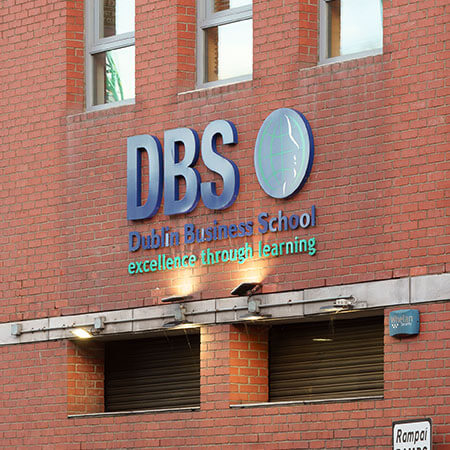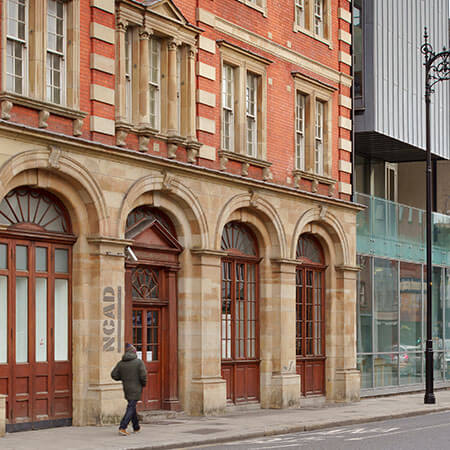Just under 1250,000 students attend Dublin’s five universities. Trinity College, which is the oldest, is right in the heart of the city and is also home to famous attractions like the Book of Kells. The other three have campuses scattered throughout the city suburbs.
There is also another university based just outside of Dublin in the town of Maynooth – it’s about 25km away from the city centre.
Each of these universities has its own particular strengths and between them they offer courses in everything from astrophysics to zoology. Although medicine, science, business, law and the humanities tend to be the most popular choices.
All of them feature in either the QS World University Rankings or Times Higher Education (THE) rankings for 2024 and three even rank among the top 500 universities in the world. If you plan to study in Dublin, here’s an introduction to each of these Dublin universities.
Trinity College Dublin (TCD)
Trinity College Dublin, the University of Dublin is an international university, steeped in history with a reputation for excellence in education, research and innovation.
Trinity is Ireland’s leading university and is ranked 81st in the world (QS 2024). Trinity is also ranked 91st in the world for graduate employability (QS 2022) and has been inspiring generations of brilliant thinkers for over 400 years.
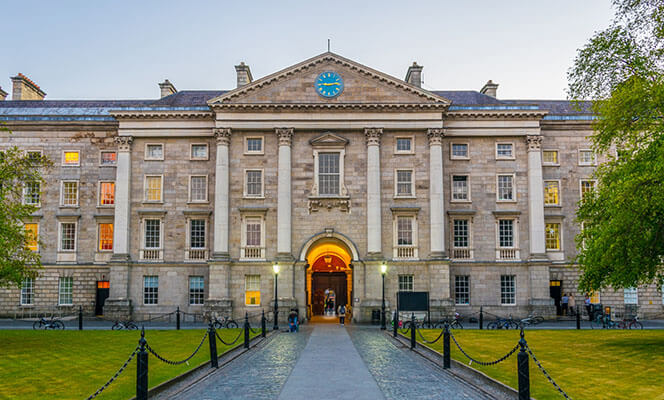
Trinity College Dublin
Located in an iconic campus in the heart of Dublin’s city centre, Trinity is home to 18,000 students across all the major disciplines in the arts and humanities, business, law, science, technology, engineering, maths and health sciences.
Trinity is also ranked as the 31st most international university in the world (THE 2024). Trinity has students and staff from 118 different nationalities on campus, making it a truly diverse and international university.
Trinity’s has produced some of the world’s finest, most original minds including the writers Oscar Wilde and Samuel Beckett (Nobel laureate), the scientists William Rowan Hamilton and Ernest Walton (Nobel laureate), the political thinker Edmund Burke, and the former President of Ireland and UNHCR Mary Robinson. This tradition of independent intellectual inquiry finds expression today in a campus culture of scholarship, innovation, creativity, entrepreneurship and dedication to societal reform.
Discover more at tcd.ie/study
University College Dublin (UCD)
UCD is one of Europe’s leading research-intensive universities occupying an extensive parkland estate of 133 hectares in south Dublin. Globally recognised for its excellence in teaching and learning, UCD has 4 subjects ranked in the top 50 in the world (QS World University Ranking by Subject 2021).
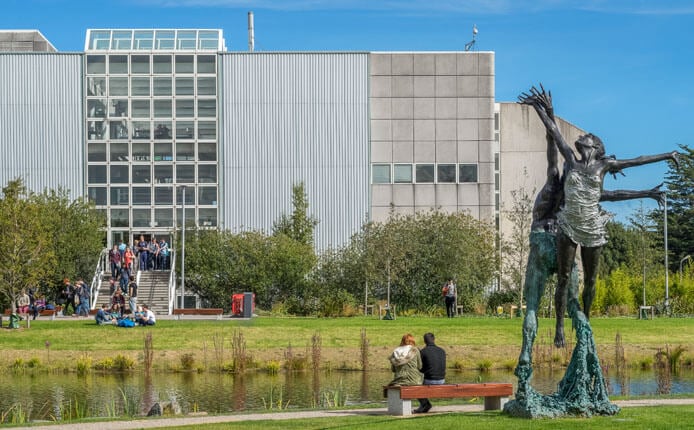
University College Dublin
UCD is Ireland’s leader in graduate education with over 9,900 graduate students; almost 20% of whom are graduate research students. Some 1,666 PhD students benefit from a structured PhD programme as well as the research-led education culture at UCD. Due to the quality and depth of UCD’s connections with employers and the excellence of UCD graduates as rated by employers, UCD has been ranked number one in Ireland for Graduate Employability since 2018 (QS Graduate Employability Rankings 2018, 2019, 2020 and 2022).
As the number one ‘university of destination’ for international students coming to Ireland, UCD’s over 8,000 international students make up 25% of the student body, while international academics make up 32% of UCD’s faculty.
UCD has developed a network of UCD Global Centres in North America, UAE, India, China and Malaysia; each of which provides a hub of research and education connections for students, faculty, alumni and partners. And in Dublin, the UCD Global Guides are always on hand to help international students to make the most of their campus experience.
Find out more at ucd.ie/global
Dublin City University (DCU)
Dublin City University (DCU) is a young, dynamic and ambitious university with a distinctive mission to transform lives and societies through education, research and innovation.
It has almost 18,000 students, drawn from 50 different nationalities, and over 80,000 alumni across its five faculties – DCU Business School, Humanities & Social Sciences, Institute of Education, Engineering and Computing, Science and Health. DCU has five campuses in the north of Dublin city.
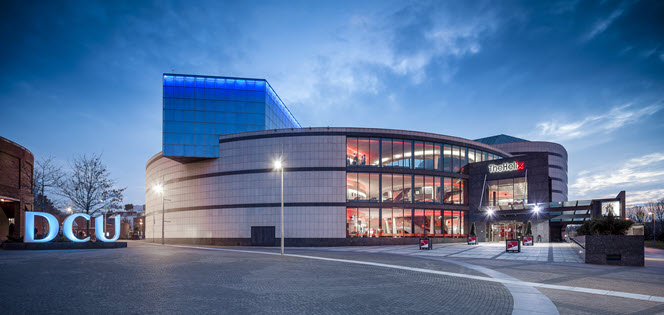
Dublin City University
The university is ranked 23rd in the world for its graduate employability rate, and ranked No 1 in Ireland, according to the QS Graduate Employability Rankings 2022.
The University prides itself on the ‘DCU Student Experience’, for the quality of the learning experience and the friendliness of the campus. The aim is to ensure that each student who studies at DCU receives personalised attention and every opportunity to develop themselves academically, professionally and personally.
A core element of DCU’s vision is to be a globally-significant university that is renowned for its discovery and translation of knowledge to advance society.
Find out more at dcu.ie
Technological University Dublin (TU Dublin)
Formed in 2019, TU Dublin is Ireland’s first technological university. It is a multi-campus university made up of Dublin Institute of Technology, the Institute of Technology Blanchardstown and the Institute of Technology Tallaght. As a result, it has locations in the city centre and across a number of Dublin suburbs.
If you’re thinking about studying at TU Dublin, here’s what you need to know about each campus.
Dublin Institute of Technology (DIT)
DIT’s history stretches all the way back to 1887 when Ireland’s first technical institution was established. Since then, it has distinguished itself in areas like engineering, science, marketing, pharma and journalism. Several of its alumni also hold prominent places in Ireland’s political class.
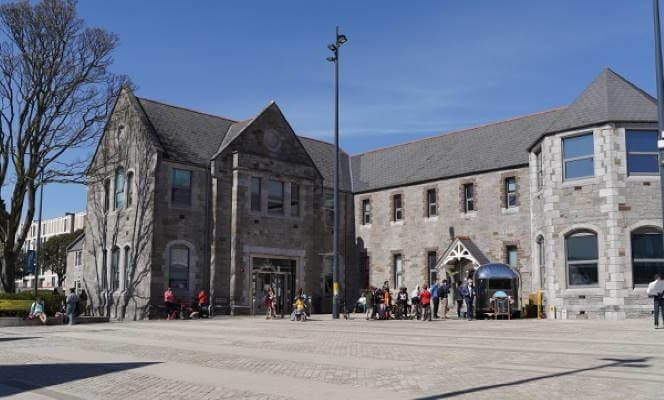
TU Dublin’s Grangegorman campus
Around a fifth of DIT’s students come from overseas and are supported by a proactive international office. DIT is currently in the process of moving all its students to a brand new, purpose-built campus in Grangegorman, just north of the city centre.
Institute of Technology Blanchardstown (ITB)
ITB brings a wide range of subjects to the students of TU Dublin. It offers a selection of awards, from certificates to PhDs and the campus is well-known for its rich variety of sporting clubs. Whether you’re into football, frisbee or martial arts, you’ll find a place here at ITB.
If you need an introduction, ITB’s international office is on-hand to welcome students from all around the globe too.
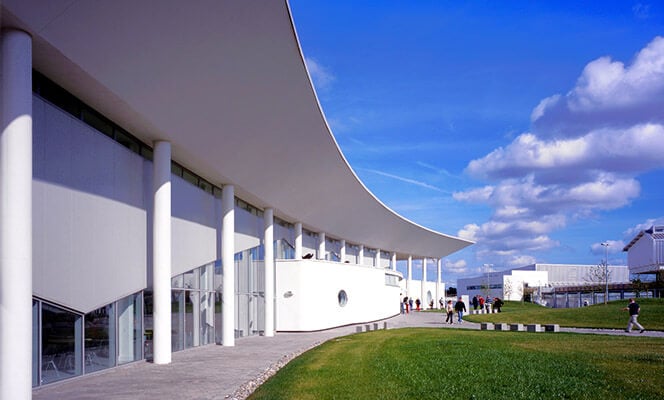
Institute of Technology Blanchardstown
Institute of Technology Tallaght (ITT)
The ITT campus, which is part of TU Dublin, offers courses in subjects like advertising, marketing, accountancy, IT, science, engineering and the humanities. It provides students with awards ranging from higher certificates right up to PhDs.
The ITT international office supports students moving to Dublin for their studies and runs scholarship programmes with several overseas countries too.
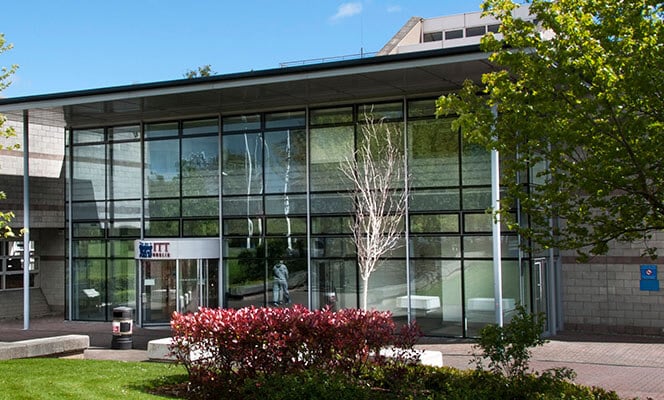
Institute of Technology Tallaght
TU Dublin also has an International Foundation Year Programme. This offers students from non-English speaking backgrounds an opportunity to improve their language skills before beginning a course. Find out more about becoming an international student at TU Dublin here.
Maynooth University (NUIM)
Maynooth University is Ireland’s fastest-growing university. It has over 11,000 students from more than 90 countries. Although it appears in The Times‘s Higher Education Young Universities listings, its tradition of academic excellence in the humanities and sciences can be traced back to 1795. Located in Ireland’s only university town, 25 kilometres west of Dublin city centre, it is easily accessible by car, bus, bicycle and train.
With seven cutting-edge research institutes and an excellent record for commercialising its research, Maynooth provides many opportunities for students to further their academic and professional careers.
Maynooth University is home to three academic faculties – Arts, Celtic Studies and Philosophy; Social Sciences; Science and Engineering. Within each one, students can choose programmes from undergraduate to doctorate level across a range of disciplines, including the humanities, music, education, social sciences, law, business, accounting, digital media, science and engineering.
Find out more about applying as an international student here.
RCSI University of Medicine and Health Sciences
RCSI University of Medicine and Health Sciences is an independent, not-for-profit university and its mission is to ‘Educate, nurture and discover for the benefit of human health’. Established in 1784, RCSI was founded as the national provider of surgical training in Ireland.
In the years since, RCSI has evolved to become one of the world’s leading health sciences universities. With over 60 different nationalities represented in its undergraduate student body and more than 32,000 alumni from 96 countries around the globe, RCSI is also one of the most international in its outlook.
Times Higher Education (THE) has ranked RCSI in the world’s Top 300 Universities for each of the last seven years. THE also ranks RCSI at #5 in the world for ‘Good Health and Well-being’, which is testament to the commitment of its staff, students and researchers to meeting the United Nation’s Sustainable Development Goal 3.
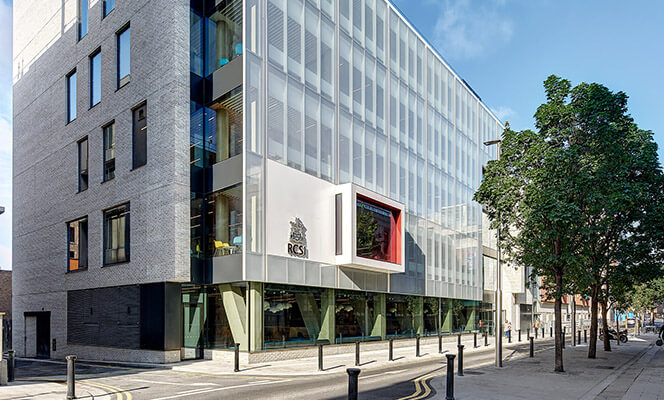
Royal College of Surgeons in Ireland (RCSI)
International students are welcome at all of these Dublin universities. But it’s worth noting that they also have the option to study at Dublin’s third level public and private colleges too.








